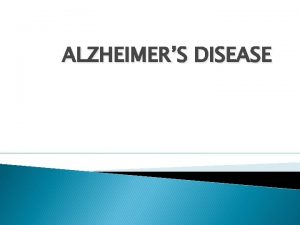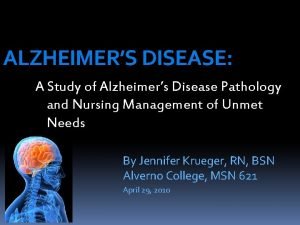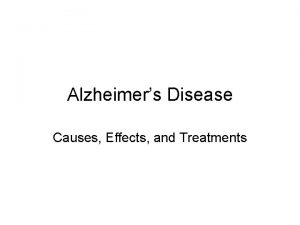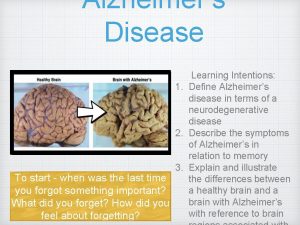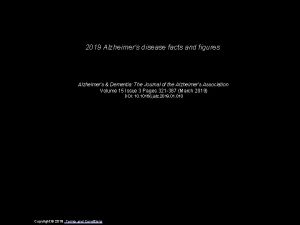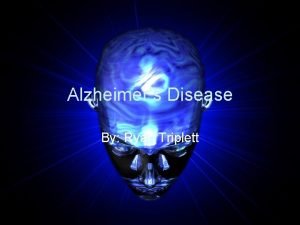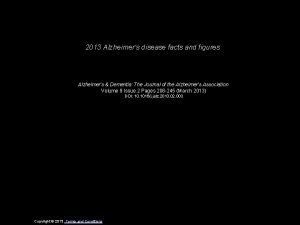Alzheimers disease is a disease that decreases memory









- Slides: 9


Alzheimer’s disease is a disease that decreases memory, reasoning and ability to care for yourself it makes a person unable to function correctly. This usually occurs in elder people in their 40 s or 50 s. (AD) Alzheimer's disease gradually gets worse over time, impacting their memory, thinking, and their behaviors.

History Of Alzheimer's Disease: The very first person to be diagnosed with Alzheimer's disease in 1901, was Auguste Deter at the age of 51. Her Alzheimer’s got worse and caused severe memory problems, confusion and difficulty understanding questions which drove her crazy, she later died in 1906. This incurable, and terminal disease was first presented in 1906 by a German physician, Dr. Alois Alzheimer, who had examined Auguste before and after her death.

The Cause of AD. Is not entirely known. If you have a close family member who suffers from Alzheimer's it increases your risk of getting it. (Genetic) The causes likely include genetics, environmental, and lifestyle factors. Genetics: play a big role for people with Alzheimer's disease if its in your family then you are more likely to get AD. at an earlier time period (30 -60 years old) this is called early-onset. Environmental: includes big new changes such as a sudden death of a loved one or a new home (usually a nursing home). Lifestyle: is any kind of change in ones life that impacts the patient in a way.

Symptoms of Alzheimer's Disease: Early Symptoms: › Language problems. › Misplacing items › Getting lost- in familiar routes. › Personality changebehavior becomes aggressive. › Lose interest of things › Anxiety Later Symptoms: Forget details of current events. Forget their memories. Forget who they are. Hard time with reading/writing Poor ability to recognize danger. Change in sleep patternsoften wake up at night. Have depression, delusions, and violent behavior

Specialists ask questions about daily life and your past life. They see if your personality has changed in your behavior and in your reactions. Test memory to test your mind on problem solving, attention, counting, and language skills Brain scans. To make sure it is Alzheimer's Disease and not another thing, they make you go to 3 different specialists. Geriatricians: who know the general health of elder people and emotional problems. Neurologists: focus on abnormalities of the brain and central nervous system , they conduct and review brain scans. Neurophysiologist- who can test memory and thinking.

Cures: Currently no cure but you can improve it by: › Taking medication treatments, may help with cognitive and behavioral symptoms. Sleep patterns can be improved by: › Sleep medication › Avoiding : caffeine, and alcohol Patients with AD. are encouraged to stay active, and to be in a safe environment.

Organic or functional? Organic because the brain is damaged slowly. The brain gets cavities, and parts are destroyed. As time progresses the brain is harmed dramatically. http: //www. emergentuniverse. org/#/damage

http: //www. google. com/#hl=en&q=alzheimer%27 s&tbs=dfn: 1&tbo=u &sa=X&ei=Vx. OKTour. D 82 Fs. AKgoqyo. Dw&sqi=2&ved=0 CDQQk. Q 4&ba v=on. 2, or. r_gc. r_pw. , cf. osb&fp=298 cfbc 9 b 6 f 1239 a&biw=1024&bih=57 1 http: //www. emergentuniverse. org/#/damage www. nchi. nlm. nih. gov www. nia. nih. gov www. ahaf. org/alzheimers/about/understanding/history. html










